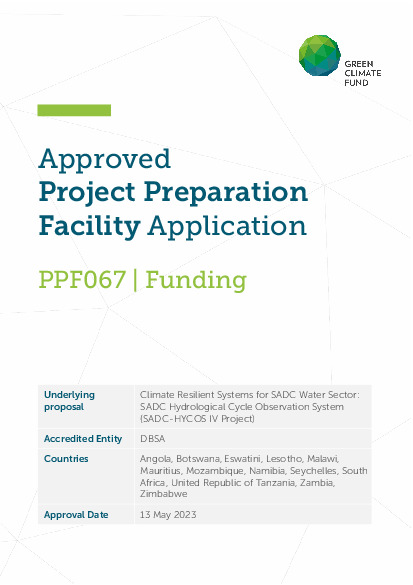Climate Resilient Systems for SADC Water Sector: SADC Hydrological Cycle Observation System (SADC-HYCOS IV Project)

Climate Resilient Systems for SADC Water Sector: SADC Hydrological Cycle Observation System (SADC-HYCOS IV Project)
This PPF request is being submitted to support the development of a Funding Proposal for the proposed project titled: Climate Resilient Sytems for SADC Water Sector: SADC Hydrological Information System. The project will develop and implement a regional climate resilience water investment programme in Southern Africa. The programme is part of the Continental Africa Water Investment Programme (AIP), adopted by the African Union Heads of State in February 2021. The goal of AIP is to transform the investment outlook for climate resilient water security and mobilise USD30 billion/year to close the water investment gap estimated at $11-$20 billion/year by 2030. AIP is supported by an International High-Level Panel on Water led by Chairperson of the African Union- H.E Macky Sall, President of the Republic of Senegal, Co-Chairs-Prime Minister of the Netherlands, President of Namibia; and H.E Jakaya Kikwete, Former President of Tanzania. The Panel supports AIP to mobilise climate resilient investments.
Increasing climate hazards threaten these existing investments in water, energy, food security, human health, and socio-economic development. Many countries have poor climate information and early warning systems (CIEWS), 49% of Least Developed Countries (LDCs) -majority from Africa, have no fit-for-purpose multi-hazard early warning systems (MHEWS). Accurate science-based climate information and data is the foundation of resilience building and achievement of water-related socio- economic development and targets of the Paris Agreement and Sustainable Development Goals (SDGs). Inadequate climate information, poor early warning systems and a paucity of reliable data constrain science-led investment decision-making.
In southern Africa, frequent climate hazards pose significant risks to water security by increasing the water investment gap, disrupting Climate Information and Early Warning Systems (CIEWS) and causing damage to hydrological information monitoring systems and water infrastructure. Since 1980, more than 142 million people in southern Africa have been impacted by climate-induced disasters such as the 2019 tropical cyclones Idai and Kenneth. The disasters wreaked havoc in Mozambique, Malawi, Zimbabwe, Madagascar, and the Comoros, leaving over 1,000 people dead, thousands without shelter and in need of more than $2 billion in humanitarian aid. In April 2022, South Africa recorded 459 fatalities due to floods in Durban. Inadequate access to CIEWS and Multi-Hazard Early Warning Systems (MHEWS) undermines investment decision-making and are a key bottleneck to developing science-based water resilience. Urgent investments are needed to restore and install appropriate CIEWS and hydrological infrastructure as a foundation for science-led investment decision-making and access to innovative blended finance for sustainability.
The proposed SADC regional climate-resilient water investment programme will leverage the high- level political commitment of the AIP to address key barriers in the provision of reliable CIWES and implement paradigm-shifting pathways towards transformational resilient water investments. This will be achieved through: (i) Strengthening high-level pollical commitment and access to CIEWS; (ii) promoting Impact-Based Multi-Hazard Early Warning Systems and Early Action; (iii) strengthening CIEWS for infrastructure design and resilience financing; and (iv) development and implementation of climate-resilient gender transformative investments. Interventions will also promote access to innovative blended finance and private sector sources such as pension funds, insurance, sovereign wealth funds, guarantees, private equity and others.
DBSA will be the Accredited Entity (AE) for the proposed project. Given the geographic scale and the limited existing information on CIEWS and climate-informed investment in the region – which includes several Least-Developed Countries, as well as countries with damaged hydrometeorological infrastructure as a result of cyclone activity – the AE is unable to finance the development of an investment-ready GCF Funding Proposal. A Project Preparation Facility (PPF) is consequently being sought to finance: i) a full Feasibility Study, including climate vulnerability, situation, technical feasibility and economic analyses; ii) project design costs, including stakeholder workshops for PPF kick-off and project validation; and iii) environmental, social and gender due diligence, in accordance with GCF and DBSA guidelines.
The abovementioned activities will facilitate the development of an investment-ready GCF Funding Proposal that, if accepted, will build the resilience of the entire SADC region by facilitating a paradigm shift towards investments in scarce water resources that are informed by high-quality CIEWS and using innovative financing approaches for climate resilience.